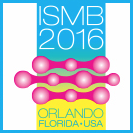Call for papers
CAMDA, an interdisciplinary conference dedicated to the Critical Assessment of Massive Data Analysis is soliciting contributions for its 15th meeting on 8–9 July 2016 at the ISMB. Over the past decade, CAMDA has been a forum for academic researchers and industry practitioners to share their research and experience in the analysis of genome-wide data, such as gene transcript or protein expression profiles. Many novel algorithms have been introduced first at CAMDA.
Analyses performed on the challenge data sets are preferably considered for oral presentation.
Challenge data set
For CAMDA 2016, we have have compiled the following exciting contests:
- The Oxford Nanopore ‘wiggle space’ challenge: Several gut microbiota samples had their DNA sequenced by Nanopore long read next-next-generation sequencing as well as more established sequencing technology.
- Sequencing Quality Control neuroblastoma study: A comparison of RNA-seq and Agilent microarray gene expression profiles for clinical endpoint prediction (Zhang et al, Genome Biology 2015) assessed 498 children patients.
- The FDA SEQC consortium has compiled a series of synthetic benchmarks and applied use-cases to assess the performance of modern gene transcript expression profiling methods, for the first time systematically assessing RNA-Seq in a wider context. SEQC is providing a following benchmark challenge to CAMDA 2016: A toxicogenomics study with matched NGS and microarray profiles for the response of over 100 rat livers to 27 chemicals with 9 different modes of action.
Please see the contest data set page for more information.
Any data set
Analyses can also be based on other data sets, generated by the presenting lab or by another group, although in all cases the data set must be made publicly available (raw measurements and derived data) if the paper is selected for presentation. Novel approaches to analysis are encouraged. Different types of data can be considered although they should include some form of quantitative measurements (no pure sequence analyses, please). A biologically meaningful interpretation of the data is considered of critical importance.
Submission rules
- All abstracts submitted to CAMDA must be previously unpublished original work.
- You will be required to sign a copyright release for the final paper for publication in the conference proceedings. If we are unable to obtain a publisher or if your paper is not deemed to be of sufficient quality by the editors, your copyright will be returned to you to use for your own publication purposes.
- While you can present your work at other conferences at any time, no journal publication of your results is allowed prior to the CAMDA conference.
- Authors are encouraged to reference the proceedings of earlier years regarding the format and style of contributions.
- Researchers must agree to make the analytical results and procedures publicly available. Analytical or executable code must be made available and can be released commercially or freely. The publication of source code is strongly encouraged.
Paper submission format
An extended abstract is necessary for the selection process by the scientific committee. This should include key results, figures, and tables. For original research papers the length of the extended abstract is limited to five pages (at 12pt Times Roman). Longer submissions cannot be considered. Abstracts must include the title, authors, affiliations, and contact email addresses. The name of the presenting author should be underlined.
All papers should be submitted electronically as PDF, Microsoft Word, or OpenOffice files online: easychair/CAMDA2016.
All authors will have an opportunity to update and revise their manuscripts after the conference. Final papers to be published in the CAMDA 2016 proceedings will be due 25 August 2016. We will prepare a fast-track journal publication of a selection of contributions (special edition of Systems Biomedicine). The publication of final papers is entirely at the discretion of the editors based on the quality of submission.
The deadline for paper submission is 20 May 2016.
Presentation format
Accepted papers will be invited for oral and/or presentation in the CAMDA 2016 conference. The authors will be notified by 30 May 2016.
- Oral presentation: The time allocated for each presentation will be 30 minutes followed by 10 minutes of questions and answers. This time limit may change based on the number of submissions.
- Poster presentation: The maximum size of the poster is 46 inches (wide) x 45 inches (height)
CAMDA paper presentation guidelines
Feedback of previous CAMDA attendees indicates a need for the emphasis of biological relevance in addition to the data mining methodology. The submitted contributions are encouraged to include:
- The proposed analytical objective (problems to be solved).
- A brief summary of the analytical effort (how to solve the problems).
This includes procedures for data extraction, preprocessing tasks such as normalization, as well as the data mining steps and algorithms used. Last but not least, the criteria for evaluating results must be clearly described. - Interpretation of results and presentation of discoveries in a biological context.
- Discussion of the merits, assumptions, and limitations of your approach.
- Conclusions
Questions concerning the CAMDA 2016 Call for Papers should be directed to: camda2016@easychair.org.
Call for posters
CAMDA, a community-wide experiment of microarray data analysis, calls for your participation in 2016 to be a part of our Poster Fair. We are inviting original posters related to any data sets. All submissions must follow these rules:
- All abstracts submitted for presentation at CAMDA must be previously unpublished original work.
- You are, however, allowed to present your work at other conferences.
- Authors are encouraged to reference the proceedings of earlier years (Methods for Microarray Analysis, volume I, II and III. Kluwer, Boston, MA.) for the previous contributions.
- Poster presentation: The size of the poster board is 46 inches (wide) x 45 inches (height). Please keep in mind that there will not be room for your poster presentations to be larger than these dimensions. If your poster is larger then the specified width you will not be able to show all your work.
Poster submission format
An abstract is necessary for the selection process by the scientific committee. The abstract should include key results, figures, and tables. For posters the length of the abstract is limited to two pages (at 12pt Times Roman). If your abstract exceeds this limit, your submission cannot be considered. Abstracts must include the title, authors, affiliation and contact email addresses. The name of the presenting author should be underlined.
All papers should be submitted electronically as PDF, Microsoft Word, or OpenOffice files online: easychair/CAMDA2016. Suitable posters will be accepted in order of submission as capacity permits.
The deadline for poster submission is 25 May 2016.
CAMDA poster presentation guidelines
Feedback of previous CAMDA attendees indicates the need for emphasis of biological relevance in addition to the data mining methodology. The submitted contributions are encouraged to include:
- The proposed analytical objective (problems to be solved).
- A brief summary of the analytical effort (how to solve the problem).
- This may include the data preprocessing tasks such as data normalization, and data extraction, data mining steps and algorithms used, as well as the evaluation criteria.
- Interpretation of results and presentation of discoveries in a biological context.
- Discussion of the merits, assumptions, and limitations of your approach
- Conclusions
Questions concerning the CAMDA 2016 Call for Posters should be directed to: camda2016@easychair.org.






















STAY CONNECTED
Tweet